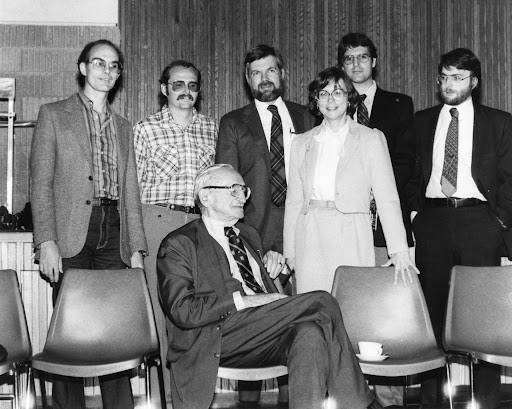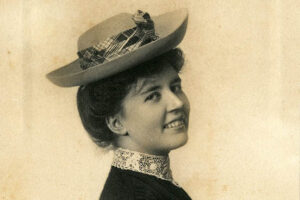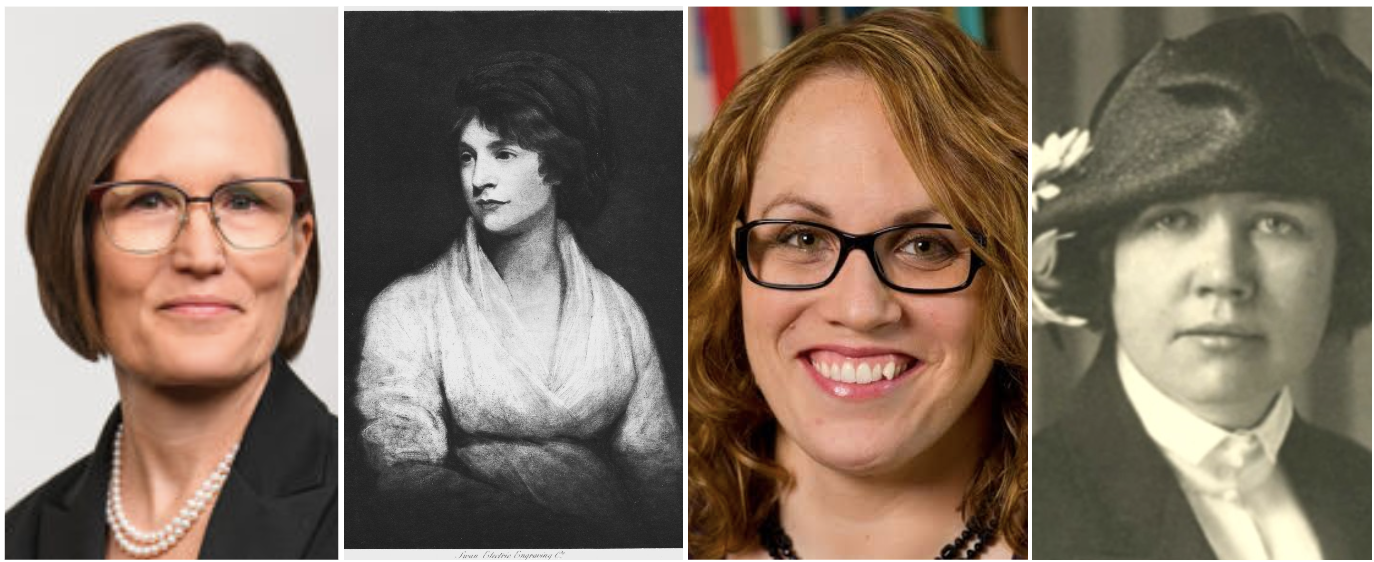
Karen Vaughn at an IHS event with Nobel Laureate, F.A. Hayek seated in front
In 1974 — the first year women were allowed to apply for credit without a male cosigner — IHS invited a young female economist named Karen Vaughn to its conference in South Royalton, Vermont. “I came away from that thinking I needed to know a whole lot more, study a whole lot more, about Austrian economics,” the woman later told IHS. She went on to become chair of the economics department at George Mason University and president of the Southern Economics Association.
In 1978 — a time when only about a fifth of doctoral degrees were earned by women — IHS awarded a Black female writer a fellowship that allowed her to go back to school and earn her PhD. “I am neither a crusader nor a chaser of windmills,” the woman told IHS at the time. “I want simply to engage in the very complicated task of learning and teaching the truth.” She went on to teach at several universities and serve as a faculty fellow at Harvard University’s Kennedy School of Government.
“Once we enter an economy where mental abilities are the comparative advantage, not physical being, that is liberating for women.”
– Emily Chamlee-Wright
In 1989 — when STEM-related jobs were overwhelmingly held by men — IHS awarded a Humane Studies Fellowship to a young woman who was about to enter Cornell Law School. When she gathered with the other summer HSF fellows at IHS to discuss their research topics, she was the only female. She became an expert in telecommunications and privacy law and went on to serve in tech policy positions at several free-market think tanks in Washington, D.C.
Over the last 60 years IHS has supported and connected thousands of scholars, many of whom were women breaking new ground in male-dominated fields. Over generations, these women mentored and inspired younger female scholars, growing a network of women deeply engaged in the exploration of classical liberal ideas.
With this strong network of classical liberal female scholars, IHS was able to draw special focus to the unique relationship between women and classical liberal ideas.
“Women benefit the most once we are freed from an economy of brute force,” IHS President Emily Chamlee-Wright said on an Ideas in Progress podcast episode on “Classical Liberalism and Women.” Economic progress, she explained, has had a particularly transformative effect on women’s lives. “Once we enter an economy where mental abilities are the comparative advantage, not physical being, that is liberating for women.”
Jayme Lemke, senior fellow at the Mercatus Center, explained in a speech at IHS that the Industrial Revolution quadrupled the marginal product of women’s labor. “This is a moment, a change in time, that gives women so much more power to bargain than they ever had before.”
“This is the nature of human energy; individuals generate it, and control it. Each person is self-controlling, and therefore responsible for his acts. Every human being, by his nature, is free.”
– Rose Wilder Lane
Under the most recent two IHS presidents — both women — IHS has convened professors and students to discuss Rose Wilder Lane, Mary Wollstonecraft, Isabel Paterson, and Frederick Douglass on the rights of women. Scholars have also presented their own work on the history and future of women’s freedoms.
At a discussion colloquium, Julia Norgaard, assistant professor of economics at Pepperdine University, spoke to graduate students about how women have historically organized through clubs and associations to provide public and social goods like libraries, education, and work training.
In an IHS summer seminar, Lauren Hall, associate professor of political science at the Rochester Institute of Technology, spoke about how women have resisted attempts by communities or states to interfere with child-raising. “It starts with the women,” Hall said.
At an academic research seminar, Diana M. Hechavarria, associate professor of entrepreneurship, presented data on the gender gap in entrepreneurship.
In a speech at IHS, Jessica Flanigan, associate professor of leadership studies at the University of Richmond, argued that a woman’s right to choose can be understood as “a foundational right that merits protection under a classical liberal framework.”
For the last 60 years, IHS has made scholarship and discussion of women’s rights, freedoms, and role in civil society possible. The generations of female scholars supported by IHS in its early years helped to teach and inspire the generation that is still now exploring classical liberal ideas from a woman’s perspective and women’s issues from a classical liberal perspective.

As for IHS staff, they may take some inspiration from writer Rose Wilder Lane, the eponym of IHS’ Rose Wilder Lane ConferenceRoom. Lane, the daughter of Little House on the Prairie author Laura Ingalls Wilder, was born in the Dakota Territory in 1886 — over thirty years before the 19th amendment granted women the right to vote. Considered one of the “mothers” of the modern libertarian movement, Lane wrote about individual freedom and railed against racism, communism, and war. In her 1943 book The Discovery of Freedom, she wrote:
“This is the nature of human energy; individuals generate it, and control it. Each person is self-controlling, and therefore responsible for his acts. Every human being, by his nature, is free.”
Those words are now painted on the wall of Lane’s namesake conference room in the IHS office.
